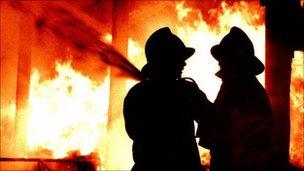Spending Review: Morale low as firefighters ponder cuts
- Published

Fire authorities are looking at ways to save money
Firefighters - like others in the public services - are bracing themselves for bad news when the government announces the results of its Spending Review on 20 October.
Unions warn that a 25% cut could see 10,000 people losing their jobs since more than four-fifths of the fire service budget goes on staff costs.
"That's one in five firefighters gone. It is very easy to be parochial but the fire service is the front line of the front line," said David Green, national officer of the Fire Brigades Union.
The union's fears are based on the fact that government departments had been asked to demonstrate how they might make cuts of between 25% and 40%.
Such drastic cuts could lead to waits of up to 25 minutes for appliances to reach emergencies in some areas, Mr Green warned.
It is a claim contested by the goverment: "The government aims to ensure that front line services are protected from the impact of the savings being made in order to tackle the record budget deficit," a spokesman said.
The union is organising a national rally and lobby of parliament on Wednesday, 17 November, to oppose any spending cuts.
Fire authorities have been looking at a number of ways to save money.
These have included the possible closure of some fire stations, reducing the size of fire crews on appliances, scrapping some senior posts or going for radical administrative reorganisation by merging individual fire authorities.
Mr Green acknowledged the figure of 10,000 job losses was speculation. "But that's all we can do at the moment," he said.
"You are not just cutting into the fat you are cutting into the bone."
Closing stations would mean crews potentially having to travel further to reach emergencies.
It could become "a postcode lottery" how quickly a fire appliance got to you, he said.
Firefighters want the November rally to address more than just the cuts issue.
The FBU's promotional leaflets for the event paint a picture of firefighters under attack.
In addition to cuts firefighters are concerned about a number of ongong issues and disputes.
Ian Lehair, the FBU's executive council member for London said: "I have been in the fire service now for 20 years. Morale has never been so low."
They are concerned about the prospect of a two year pay freeze and worsening local conditions of service.
There has also been an upward trend in firefighter deaths at work.
Quite independently from the Spending Review, the Hutton Inquiry has also been looking into the cost of public sector pensions.
Mr Lehair said firefighters could end up paying more into a pension to receive less or having to work longer.
In London, firefighters have voted for strike action in a separate dispute over proposed changes in shift patterns which would mean shortening the night shift and lengthening the day shift.
Mr Lehair said firefighters were being threatened with dismissal unless they signed new contracts.
He said a leaked memo had shown the fire authority had been considering reducing fire cover overnight. The shift changes could help make such cuts possible.
But London Assembly Member Brian Coleman, chairman of the London Fire and Emergency Planning Authority which runs the London Fire Brigade, said longer day shifts would allow firefighters to get more specialist training.
Any fire authorities thinking of closing fire stations might want to look at the recent experience in Warwickshire where 41,000 people responded to a council consultation - the vast majority opposing any closure.
The council still plans to close three stations but Warwickshire's chief fire officer Graeme Smith acknowledged there had been a lot of opposition and there was a need to protect public confidence.
Scotland could focus its need to save money by administrative reorganisation. The eight fire authorities could be reduced to just three. It would reduce duplication and enable backroom functions to be shared.
The Lothian and Borders chief fire officer Jimmy Campbell said he believed such a change was a foregone conclusion in the face of public sector cuts.
He said: "If we look at the number of fire and rescue services in Scotland there must be a better way of doing things."
Fire authorities up and down the country are waiting for the outcome of the Spending Review and already looking for ways to save cash that won't jeopardise the ability of firefighters to save lives.
- Published24 September 2010
- Published24 September 2010
- Published3 September 2010
- Published28 June 2010
- Published10 August 2010
- Published10 September 2010
- Published22 June 2010
- Published1 October 2010